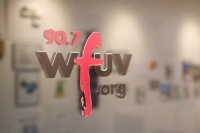By Ian Roden

Norwood News will publish a print version of WFUV’s five part series on illiteracy in the Bronx. (Owen Corrigan/The Fordham Ram)
For the first time, Fordham’s radio station, WFUV, is partnering with fellow Bronx media outlet Norwood News on a joint reporting project to serve the local community.
Fordham students in WFUV’s news department produced a five-part series on illiteracy in the Bronx. Audio segments aired on WFUV radio and are available on their website, while a complimentary print version was published by Norwood News.
“We thought it was a great opportunity to partner with the Norwood News,” said George Bodarky, news director of WFUV. “It provides us a chance to make an impact in a borough where we’re based.”
The series covers five different types of illiteracy: functional, financial, civic, civil rights and health care.
Students working at WFUV investigated the borough-wide dilemma themselves. One of the students was Shannon Meehan, GSAS ’17, who investigated functional illiteracy. This kind of illiteracy occurs when people have a basic education but fail to meet typical standards of reading and writing.
“There are many literacy organizations located in the Bronx working to improve literacy in schools starting in universal pre-k and continuing throughout high school, programs to bring literacy into the community and adult literacy programs addressing varying levels of literacy for adults of all ages,” said Meehan.
To learn more about the issue, Meehan met with the directors of two local literacy programs, talked with adults taking literacy programs and sat in on an English as a second language (ESL) class. She also met with a Bronx mother who relies on community organizations to get books for her children.
“It was important that I used diverse voices for the story because it is a widespread problem that affects people of all ages, races and of different education backgrounds,” Meehan said.
Meehan learned a great deal about the issue and the way local organizations like schools are trying to combat it through her reporting.
“It is not simply a matter of being able to read or not being able to read, but extends to an individual’s level of literacy proficiency,” she said. “Readiness for kindergarten and readiness for third grade are two critical benchmarks in a child’s education that indicate future success.”
Some of the things Meehan uncovered shocked her. For instance, she said that people who struggle with functional illiteracy find it so distressing that they make up ways of hiding it.
Citizens do so by “memorizing the words on a menu or by taking the same route to work daily, fearful that if they take another route they will be unable to navigate back home,” said Meehan. She said the problem of functional illiteracy stretches beyond the Bronx and affects all of New York City.
Anthony Ali, FCRH ’17, covered civic illiteracy, which deals with problems like low voter turnout, and also financial illiteracy.
Ali is in the process investigated financial illiteracy, but will cover civic illiteracy thoroughly. He researched Bronx voter turnout by contacting local officials, reaching out to the League of Women Voters in NYC, and visiting various Bronx neighborhoods that differed in terms of high and low voter turnout.
“The Bronx has shockingly low voter turnout in nonpresidential elections. In the last mayoral election, some neighborhoods struggled to reach 20 percent turnout among eligible voters,” said Ali. “A lot of the people I spoke to felt that their votes don’t matter, but the reality is that some local elections are decided by only a handful of votes.”
Through his reporting, Ali has come up with some possible solutions to help aid the civic illiteracy problem in the Bronx.
“Eligible Bronx residents need to get out and vote so they can have representatives that support the proposals that’ll in turn raise awareness,” said Ali. “At the same time, politicians need to approve these measures to raise awareness and get voters to show up to these key local elections.”
